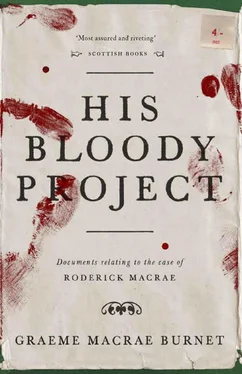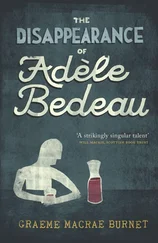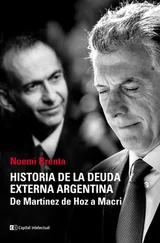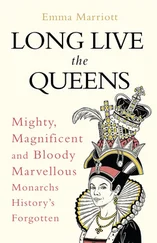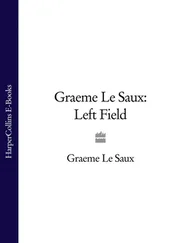Graeme Burnet - His Bloody Project
Здесь есть возможность читать онлайн «Graeme Burnet - His Bloody Project» весь текст электронной книги совершенно бесплатно (целиком полную версию без сокращений). В некоторых случаях можно слушать аудио, скачать через торрент в формате fb2 и присутствует краткое содержание. Год выпуска: 2015, Издательство: Contraband, Жанр: Современная проза, на английском языке. Описание произведения, (предисловие) а так же отзывы посетителей доступны на портале библиотеки ЛибКат.
- Название:His Bloody Project
- Автор:
- Издательство:Contraband
- Жанр:
- Год:2015
- ISBN:нет данных
- Рейтинг книги:5 / 5. Голосов: 1
-
Избранное:Добавить в избранное
- Отзывы:
-
Ваша оценка:
- 100
- 1
- 2
- 3
- 4
- 5
His Bloody Project: краткое содержание, описание и аннотация
Предлагаем к чтению аннотацию, описание, краткое содержание или предисловие (зависит от того, что написал сам автор книги «His Bloody Project»). Если вы не нашли необходимую информацию о книге — напишите в комментариях, мы постараемся отыскать её.
A brutal triple murder in a remote northwestern crofting community in 1869 leads to the arrest of a young man by the name of Roderick Macrae. There’s no question that Macrae is guilty, but the police and courts must uncover what drove him to murder the local village constable.
And who were the other two victims? Ultimately, Macrae’s fate hinges on one key question: is he insane?
His Bloody Project — читать онлайн бесплатно полную книгу (весь текст) целиком
Ниже представлен текст книги, разбитый по страницам. Система сохранения места последней прочитанной страницы, позволяет с удобством читать онлайн бесплатно книгу «His Bloody Project», без необходимости каждый раз заново искать на чём Вы остановились. Поставьте закладку, и сможете в любой момент перейти на страницу, на которой закончили чтение.
Интервал:
Закладка:
‘Since your wife’s death, your household has decreased in number and, assuming you have no plans to re-marry, this reduction must be permanent. Your allocation of land is therefore to be reduced by one fifth. There are other larger families whose crofts are smaller than yours and the land will be allocated to one of those.’
‘You mean to yourself,’ said my father.
Lachlan Broad tutted softly and shook his head as if he was offended by the suggestion. ‘Certainly not to myself, Mr Macrae. That would be an abuse of my office. The land will be allocated to an appropriate family.’
‘None of my neighbours will accept it,’ said my father.
Lachlan Broad pursed his lips. ‘We shall see,’ he said. ‘It would be in no one’s interest for the land to lie fallow.’
‘My father and grandfather worked this land before me.’
‘Yes,’ said Broad, ‘but it did not belong to them and it does not belong to you. It belongs to the laird and it is at his discretion that you have the privilege of working it.’
‘What about the rent?’
I inwardly cursed my father, as his question clearly signified his intention to yield on the matter of the reduction of the croft. If my mother had been alive, she would have immediately ejected Lachlan Broad from the house with an earful of insults, but my father was not made of such stuff.
‘What about the rent?’ said Broad.
‘If the extent of the croft is to be reduced, then so, surely, should the rent,’ said my father.
The constable gave a little laugh through his nose, to indicate the absurdity of the idea.
‘Your rent, I believe, has been in arrears for some years,’ he said. ‘If I might offer you some advice, I would not provoke the powers-that-be by asking for a reduction.’
My father stood up and, placing his knuckles on the table, leaned towards Lachlan Broad.
‘I shall seek an appointment with the factor to discuss this matter,’ he said.
Broad remained seated and spread his hands out in front of him. ‘You are quite free to do so,’ he said, ‘but I can assure you I speak with the factor’s authority. I’m sure you do not wish to gain a reputation as one of those who seeks to agitate against the smooth running of the estate, the management of which, I remind you, is carried out for the benefit of the community rather than any individual. As you have yourself stated, you do not wish to have any more black marks placed against your name.’
At this point Lachlan Broad stood up and said in a matter-of-fact way, ‘The re-allocation will take place in spring so that you will have the opportunity to take this year’s crops from the land. You may decide yourself which portion of land you wish to give up and tell me in due course.’
He then informed us that in future we should address him as Constable Mackenzie or simply as Constable, this in order that we should not forget that he was acting in an official capacity.
My father did not seek a meeting with the factor and in spring the portion of the croft furthest from the house was given to our neighbour, Duncan Gregor, who lived with his elderly mother, wife and four children. Mr Gregor called on my father to assure him that he had never sought to obtain this portion of his croft and had no wish to profit at my father’s expense. He proposed that the two families work the piece of land in common and share the harvest between them. My father refused this generous offer, saying that he had no wish to cultivate land that was not his to work and that, in any case, Mr Gregor’s needs were greater than his. Mr Gregor spent some time putting various arguments to my father, but he would not be moved. Nor would he accept any other compensation for his loss.
* * *
The nature of Lachlan Broad’s regime quickly became clear. In previous years, whoever held the post of constable had done so reluctantly and only performed their duties when pressed to do so. Lachlan Broad, however, threw himself into the role with the fervour of a fox in a hen house. He strutted round the villages under his jurisdiction, notebook in hand and a pencil behind his ear, most often accompanied by his imbecilic brother, cousin or both. The upkeep of crofts and the condition of the paths, ditches and tracks were all subjected to his scrutiny. Nor did he confine his inspections to communal areas. He thought nothing of marching unannounced into his neighbours’ houses and scribbling notes in his little book, the contents of which he would not divulge to anyone. These notes did not result in immediate fines. People knew only that the constable had taken note of something and that it might be used against them at some time in the future. Consequently, Lachlan Broad found people acquiescent when asked to work on his croft or carry out other tasks from which his self-imposed duties kept him.
Lachlan Broad decreed that the roads and tracks connecting our houses and villages had been allowed to fall into an unacceptable state of disrepair. A general programme of works was drawn up and the able-bodied men of the parish were mandated to give ten days’ labour at a time dictated by the constable. Those bold enough to question this obligation to provide their labour free of charge were informed that they were required by the terms of their tenancy to keep the communal roads and tracks properly drained and in good repair. It was thus a matter of leniency that villagers were merely being asked to carry out responsibilities they had previously ignored, rather than being fined for their neglect. Despite the grumblings about the high-handed nature of Lachlan Broad’s methods, it was widely accepted that the improvements he instituted were for the general good.
In maintaining his good name, the constable was assisted by the large number of his kinsmen who resided in the villages under his authority. Like those of other clans, Mackenzies were naturally inclined to spring to the defence of one of their own and it became commonplace, or at least it was believed to be commonplace, for disparaging remarks about Broad to be reported back to him. People thus saw the wisdom of keeping their thoughts about the constable to themselves.
One evening my father was taking the air on the bench outside our house. Kenny Smoke joined him and the two men sat in silence from some minutes sucking on their pipes. Lachlan Broad was making his way along the track which led from the road to the village, making some minute inspection of the ditches. Kenny Smoke took his pipe from his mouth, leaned in towards my father and muttered, ‘Lachlan Broad is a great arse, but there is no denying the improvement in the upkeep of the place.’
My father did not reply. He did not approve of language of this nature.
Lachlan Broad’s influence extended into every aspect of village life. The end of the black months is, in these parts, signified by the cutting and drying of the peats, which takes place as soon as the weather permits. This is a task performed by the village as a single entity, as it makes no sense for families to cut peat only for themselves. It is arduous work, but generally takes place in a good-natured atmosphere, with singing and communal refreshments. This year, however, despite the fact that the peat-cutting had been successfully accomplished since time immemorial, the constable took it upon himself to oversee the process. Work rotas were drawn up and deputies (invariably one of Broad’s own kinsmen) appointed to oversee the work in each of the villages under his jurisdiction. These deputies did no work themselves, but spent the day prowling around the bogs, barking orders at the cutters and determining at what time refreshments would be taken. This caused a great deal of resentment, as it appeared that labour which villagers had previously undertaken of their own volition, was now being carried out only at the behest of the authorities. There was thus none of the singing and good humour that normally accompanied this work. I was subject to special scrutiny, as, since the incident with the sheep, it was said that I could not be trusted with a peat iron. I was thus forced to work at some distance from the others and if I paused so much as to mop my brow, Aeneas Mackenzie would bellow at me to stop idling. I confess that I would have happily taken my tool to his skull, but not wishing to bring any more trouble to my father I worked as hard as I could, returning each evening from the mountain with arms and calves aching from my exertions.
Читать дальшеИнтервал:
Закладка:
Похожие книги на «His Bloody Project»
Представляем Вашему вниманию похожие книги на «His Bloody Project» списком для выбора. Мы отобрали схожую по названию и смыслу литературу в надежде предоставить читателям больше вариантов отыскать новые, интересные, ещё непрочитанные произведения.
Обсуждение, отзывы о книге «His Bloody Project» и просто собственные мнения читателей. Оставьте ваши комментарии, напишите, что Вы думаете о произведении, его смысле или главных героях. Укажите что конкретно понравилось, а что нет, и почему Вы так считаете.
